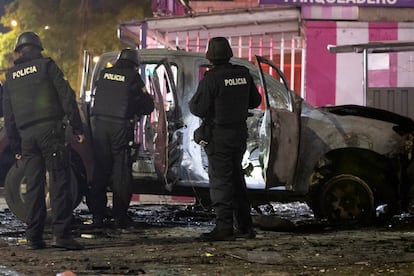Organized crime tightens it grip on Ecuador
Official document reveals the presence of 11 criminal groups in 21 of the country’s 24 provinces

Organized crime continues to plague Ecuador to the extent that it is now the third most crime-ridden country in Latin America. Over the span of three years, the nation has succumbed to the influence of drug traffickers who wield their power through terrorist attacks, gruesome displays of violence, extortion, kidnappings, and assaults on public institutions. However, such criminal activities require more than just weapons — they need the complicity of a passive government. There is ample evidence of a justice system that fails to hold perpetrators accountable for crimes. Law enforcement and military personnel have been apprehended with illicit arms and narcotics. Weapons and ill-gotten funds have been discovered in the offices of prison officials. And government neglect has handed over entire regions of the country to criminal overlords.
Two days before former president Guillermo Lasso’s departure from office, a report revealing government penetration by organized crime was ready for release. The Ministry of the Interior had scheduled a press conference to report on Ecuador’s national strategy against organized crime. However, without any explanation, the press meeting was canceled, and the report went unnoticed amid the government transition. The Lasso administration had long been urged to develop a strategy to combat crime, instead of relying on frequent state-of-emergency decrees as a habitual response to terrorist incidents. The aim was to involve the military in maintaining law and order on the streets.
The report unveils the intricate web of organized crime within Ecuador. For a long time, law enforcement refrained from explicitly naming the gangs to avoid acknowledging their power and revealing their areas of operation. Now there is a comprehensive map indicating the presence of 11 distinct criminal groups in 21 of the country’s 24 provinces. These gangs include criminals from Ecuador, Colombia, Venezuela, Peru and Mexico, and their main focus is to control drug trafficking routes. To do this, they have established logistics centers throughout Ecuador for the production, transportation and storage of illegal narcotics and chemical precursors.
As of October, drug wars have led to 6,348 murders, equating to a rate of 34.8 homicides per 100,000 residents. “One strategy is to disrupt the primary source of financing for organized crime, which involves preventing the entry of cocaine through the northern and southern borders,” said security analyst Mario Pazmiño. But drug traffickers have also expanded into firearms and ammunition trafficking, illegal mining and human trafficking.
At the local level, the gangs thrive on extortion, kidnappings and selling stolen vehicles and cell phones. “It’s a criminal holding company that’s been ignored by a government that doesn’t understand it,” said Pazmiño. “There’s a clear criminal complicity going on, and it’s because there’s a lack of political decision-making about what our country really needs.”
The security report was based on a comprehensive survey of 159 officials from 20 public institutions representing the executive branch, the judicial system, and the military and police forces. These officials collectively assessed the threats posed by organized crime and other criminal activities. International organizations, including the United Nations Office on Drugs and Crime, as well as experts from various countries, provided guidance and support throughout the process.
The majority of survey participants agreed that organized crime groups have the capacity to infiltrate and co-opt the country’s security and justice systems. The report also states that they have amassed significant economic power through money laundering and illicit enrichment. However, nothing has sent shockwaves through the country quite like the remarks made on December 7 by U.S. Ambassador Michael Fitzpatrick: “Due to their financial influence, criminal actors are taking advantage of the national passion, football [soccer]… They use the team accounts, just as they use those of fictitious companies, to wash their faces as well as their money.”
President Daniel Noboa reacted by saying, “Drug traffickers have 500 creative ways of laundering money,” making it necessary to reinforce Ecuador’s Financial Analysis Unit charged with combatting money laundering. This unit was found lacking in the latest GAFILAT evaluation. From 2017 to 2021, the Financial Analysis Unit reported 102 suspicious transactions to the Attorney General, but none were related to money laundering and only 11 resulted in convictions.
Sign up for our weekly newsletter to get more English-language news coverage from EL PAÍS USA Edition
Tu suscripción se está usando en otro dispositivo
¿Quieres añadir otro usuario a tu suscripción?
Si continúas leyendo en este dispositivo, no se podrá leer en el otro.
FlechaTu suscripción se está usando en otro dispositivo y solo puedes acceder a EL PAÍS desde un dispositivo a la vez.
Si quieres compartir tu cuenta, cambia tu suscripción a la modalidad Premium, así podrás añadir otro usuario. Cada uno accederá con su propia cuenta de email, lo que os permitirá personalizar vuestra experiencia en EL PAÍS.
¿Tienes una suscripción de empresa? Accede aquí para contratar más cuentas.
En el caso de no saber quién está usando tu cuenta, te recomendamos cambiar tu contraseña aquí.
Si decides continuar compartiendo tu cuenta, este mensaje se mostrará en tu dispositivo y en el de la otra persona que está usando tu cuenta de forma indefinida, afectando a tu experiencia de lectura. Puedes consultar aquí los términos y condiciones de la suscripción digital.








































